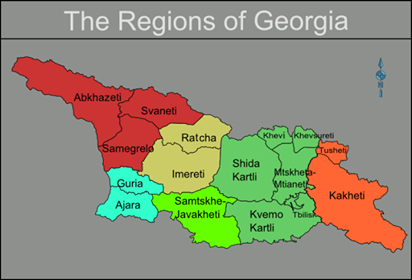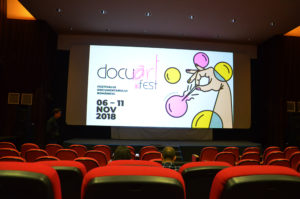Yes, Georgia is on my mind, but not the one Ray Charles is singing about. My Georgia is not in the US, it’s located in Caucasus region and we, Georgians, call it Sakartvelo.
Talking about your own country is somehow similar to talking about yourself. When people ask me “How is it in Georgia?”, I have the exact same feeling that I have at the job interviews after being asked to say a few words about myself: I don’t know where to start, how much modesty or self-confidence to show and what would be the most interesting part for others.
However, let’s leave my self-absorbed personality aside and speak about Georgia. Over the last few years, Georgia became an increasingly interesting and attracting destination for tourists and travelers. You will find many articles with these kinds of titles: “10 reasons to travel to Georgia” and then usually authors mention our hospitality, delicious food & wine, beautiful nature, unique language and alphabet, ancient history and castles in high mountains of Svaneti. Yes, all this is true, but I would like to take you on a bit longer journey. I will provide answers to so called FAQ (Frequently Asked Questions) that people in Romania (and in general, abroad,) ask me after I tell them I am from Georgia.
I am sorry to ask, but where exactly is Georgia located?
Well, even though Georgia and Romania share Black Sea, unfortunately, neither Georgians, nor Romanians know much about one another. Yes, we are on the other side of your lovely black sea, we also have nice beaches, posh places just as you have Mamaia and a very beautiful sunset into the sea as we are on the Eastern side and the sun disappears in the sea every evening. Seaside city Batumi is one of the places that is certainly worth-visiting.
Except Black Sea, we have another “natural neighbor” called Caucasus Mountainsthat are located in the Northern part of the country. And of course, we have actual neighbor countries: Turkey, Armenia, Azerbaijan and Russia.


There is a big sub-question that many people ask me and even Georgians ask themselves that sounds the following way:
Does Georgia belong to Europe or to Asia?
The answer to this question depends a lot on the definition of the question itself.
Geographically speaking, you could say it is located exactly on the border between Europe and Asia since according to many definitions, the border lies on the river Mtkvari (Kura) which flows across the whole country. So, I guess the geographical answer would be: Georgia lies on the border between Europe and Asia.
Politically speaking, it’s complicated. Georgia is part of EU-Eastern Partnership and the association agreement with EU was approved in 2014. In March 2017, the decision of EU-visa free regime for Georgian citizens came into force and the whole country was celebrating the occasion. It has finally allowed Georgians to travel without visa in Europe.
However, there are several sensitive subjects that come into play while talking about EU-Georgia relations. One of the big question marks and threats is of course, Russia, who obviously is not enchanted by the idea of Georgia becoming an integral part of Europe. Two regions of Georgia, Apkhazeti (self-proclaimed as Abkhazia) and Samachablo (self-proclaimed as South Ossetia), are currently occupied by Russia.
Culturally speaking… For me personally, this is the most interesting and at the same time, the most difficult question. However, I could say that Georgia is exactly the place where European and Asian mentalities intersect and truly blend into each other. For example, in Georgia, you can see very high value of family and strong network of relatives always ready to help each other. This is more characteristic for Eastern cultures. In Georgia, similar to many Asian countries you can observe tendency to keep traditions and inclination to conservative ideology. However, the values that are associated with European ideology as individualism, freedom of speech, striving for democracy, free will and human rights are extremely important for the Georgian society as well. Additionally, Georgia has been a Christian orthodox country since the 4th century and religion still plays an important role.
In my opinion, at the moment, Georgian society is somewhat polarized, one pole striving to extremely progressive ideas while on the other end, people try to stay loyal to a more traditional approach.
Georgian arts have been influenced by both, European and Oriental motives and as a result, we have music, literature, architecture and national dances that are truly unique. Georgian national ballet is famous for its grandiosity and emotional effect on the spectators.

What are people like in Georgia?
I have to make a big “sigh” before I start to answer this question, because seriously, where do I start? As one of my good friends often says, character of people is strongly influenced by the climate. So, Georgia being a sunny, South Caucasian country, you could say that we are open, friendly, energetic, warm, passionate, emotional and loud, but again, could you generalize things this much?
One of the most interesting things about Georgia is its diversity which might also be related to our diverse climate. Even though it is a small country with around 4 million people, every small region has its very distinctive, outstanding characteristics which give birth to region-related jokes, tales and stories. For example, people from central Georgian region Kartli are considered to be more calm and balanced, while people from one of the western regions, Guria are considered to be extremely energetic, funny and sometimes a bit crazy. There’s even a controversial joke that if a person escapes from a lunatic asylum and enters region of Guria, you cannot find them among people from Guria anymore, since everyone there is a bit crazy and you won’t be able to tell apart. Well, I honestly loved the summer that I spent Guria , because I was laughing like crazy without any break, people from there have exceptional drive for life and amazing sense of humor combined with artistic talents that guarantees constant improvised theatre performance for no charge.
If I start to list all the regions and their characteristics, it will take us too far, but certainly, all of them are worth the attention.
What language do Georgians speak, Russian?
“Ara” – which means “No” in Georgian. And if you don’t believe me, I will also say “Nyet” which also means “No”, but in Russian. See what I did there? Most of the people usually think that either Russian is our native language or that at least Georgian is one of the Slavic languages, but the truth is, Georgian belongs to the group of languages called “Kartvelian languages” and guess what language is the main language in that group? Yes, Georgian itself. So, Georgian really is a uniquelanguage with unique alphabet that has no connection to Indo-European languages.

Tell me a bit about the history of Georgia
Georgia is an ancient country, already in the 4th century BC, a unified kingdom of Georgia has existed. The Kingdom of Georgia reached its renaissance in the 12th to early 13th centuries, during the reigns of David IV and his granddaughter Tamar, who was the first female King that reigned Georgia. During this time, Georgian culture, literature, philosophy, architecture and science has been flourishing. The most important poem in Georgian literature “The Knight in the Panther’s Skin” was also written in the golden age.
The whole Georgian history is accompanied by countless wars with invadors from all the possible sides since country’s location has always been strategically attractive and beneficial. That is why the words “peace” and “victory” are important parts of everyday phrases in Georgian conversations. The translation of “Hello” and “Cheers” is “Gamarjoba” and “Gaumarjos” respectively and both of them are related to the idea of “victory”. And when a Georgian says “Good Bye” – “Mshvidobit” – he/she wishes you peace. Also, if you buy something new, you will hear “Mshvidobashi” which means that a person wishes you to use it in peace. The sad destiny of Georgia becomes even more obvious, when I think of the fact that I am 27 years old and ever since I was born, Georgia already went through 3 wars: Civil war in 1991-1993, Abkhazian War in 1992-1993 and Russo-Georgian war in 2008. So, anytime, you can wish me peace, I won’t mind at all.
What is there to visit in Georgia?
I would not be exaggerating if I ask in response: what is there NOT to visit in Georgia? You can start by the capital Tbilisi and enjoy its old town, distinctive, warm atmosphere, narrow streets, characteristic balconies and then you just put your finger on the map of Georgia and go straight there, you won’t regret for sure.

Do EU citizens need visa to travel to Georgia?
No, you don’t need a visa to visit Georgia and you don’t even need your travel passport. Your ID would be more than enough. You can even stay for one year for touristic reasons and it makes perfect sense, because that’s how much time you would need to explore the country as a tourist or a traveler.And that would only be the beginning of exploring and understanding everything Georgia is about.
For those being interested to know more, here’s a highly recommend Facebook page:
https://www.facebook.com/GeorgiaAbout/
Special thanks to Anca-Maria Bucur for the great idea about the title

Source: https://www.facebook.com/GeorgiaAbout/




